
StepWise
A C# framework to build, visualize and execute event-driven workflow
Stars: 111
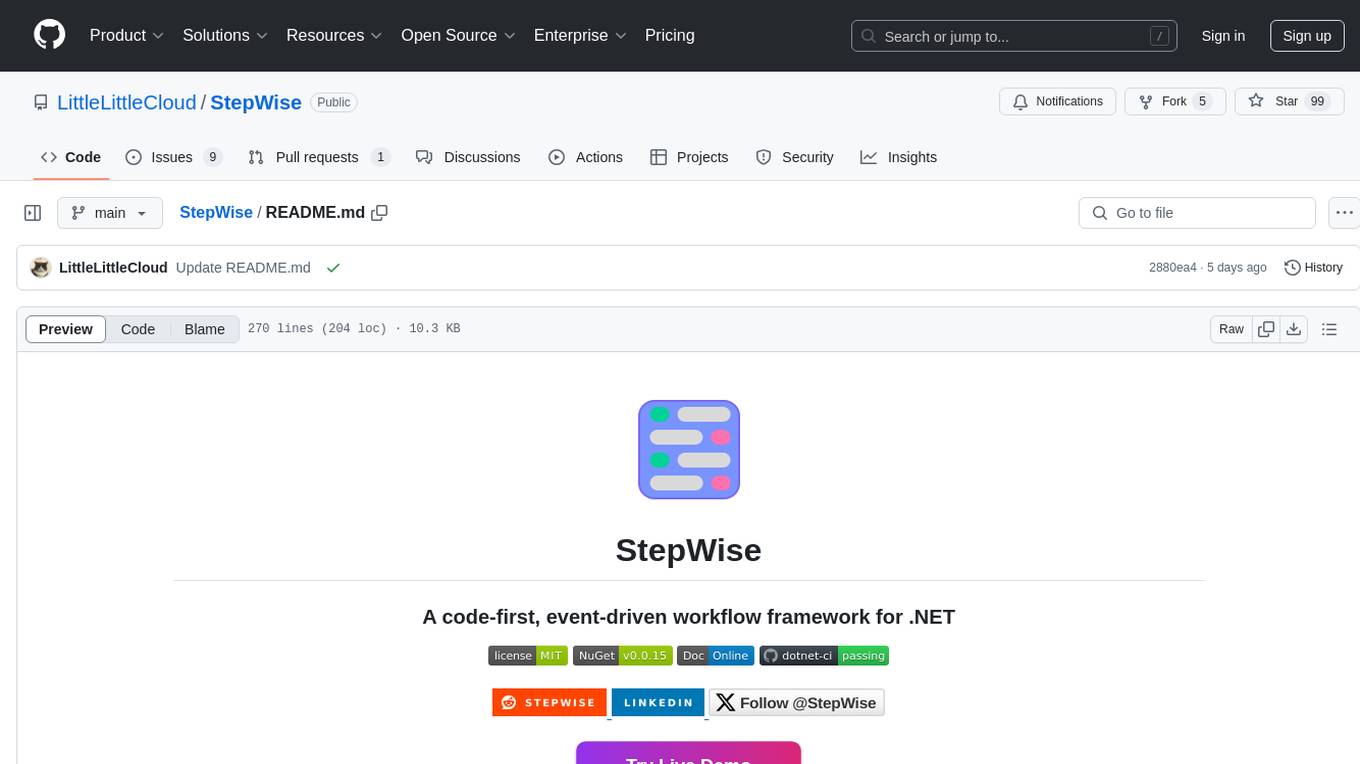
StepWise is a code-first, event-driven workflow framework for .NET designed to help users build complex workflows in a simple and efficient way. It allows users to define workflows using C# code, visualize and execute workflows from a browser, execute steps in parallel, and resolve dependencies automatically. StepWise also features an AI assistant called `Geeno` in its WebUI to help users run and analyze workflows with ease.
README:
StepWise is a .NET framework which assists you to code, visualize and execute event-base workflow. It is designed to help you build complex workflows in a simple and efficient way. StepWise comes with the following key features:
- Code-First: Define workflows using C# code in your project.
- WebUI Visualize and execute workflows from your favorite browser using StepWise WebUI.
- Event-Driven: Execute steps in parallel and resolve dependencies automatically.
-
AI-Powered: Work with
Geeno, a built-in AI assistant in StepWise WebUI to help you run and analyze workflows with ease.
- Quick Start with Template
- Quick Start
- Visualize stepwise workflow
- Examples
- Dependency Management between Steps
StepWise provides a list of templates to help you get started quickly. To install the template, run the following command:
dotnet new -i LittleLittleCloud.StepWise.TemplateThis will install the following templates:
- stepwise-console: A console application template with StepWise.
To create a new project using the template, run the following command. This will create a new console application project with StepWise WebUI configured.
dotnet new stepwise-consoleAfter creating the project, you can run the project and visit http://localhost:5123 to see the StepWise WebUI.
Here's a simple example of how to define a workflow to prepare dinner. The workflow consists of several steps, such as chopping vegetables, boiling water, cooking pasta, and cooking sauce. The final step is to serve dinner, which depends on all the previous steps. When executed, the workflow will automatically resolve the dependencies between steps and execute them in the parallel if possible.
public class PrepareDinner
{
[Step(description: """
This example demonstrates how to use stepwise to create a simple dinner preparation workflow.
- source code: [PrepareDinner.cs](https://github.com/LittleLittleCloud/StepWise/blob/main/example/HelloWorld/PrepareDinner.cs)
It returns the current time when the workflow starts and then simulates the preparation of dinner.
""")]
public async Task<DateTime> Start()
{
return DateTime.Now;
}
[Step(description: "boil water")]
[DependOn(nameof(Start))]
public async Task<string> BoilWater()
{
await Task.Delay(2000);
return "Boiled water in 2 seconds";
}
[Step(description: "cut vegetables")]
[DependOn(nameof(Start))]
public async Task<string> CutVegetables()
{
await Task.Delay(3000);
return "Cut vegetables in 3 seconds";
}
[Step(description: "cook vegetables")]
[DependOn(nameof(CutVegetables))]
[DependOn(nameof(BoilWater))]
public async Task<string> CookVegetables(
[FromStep(nameof(CutVegetables))] string vegetables,
[FromStep(nameof(BoilWater))] string water)
{
await Task.Delay(4000);
return $"Cooked vegetables in 4 seconds. {vegetables}, {water}";
}
[Step(description: "cook meat")]
[DependOn(nameof(Start))]
public async Task<string> CookMeat()
{
await Task.Delay(5000);
return "Cooked meat in 5 seconds";
}
[Step(description: """
Serve dinner.
This will call all the preparation dinner steps in parallel and return the time taken to prepare the dinner.
""")]
[DependOn(nameof(CookVegetables))]
[DependOn(nameof(CookMeat))]
public async Task<string> ServeDinner(
[FromStep(nameof(Start))] DateTime start,
[FromStep(nameof(CookVegetables))] string vegetables,
[FromStep(nameof(CookMeat))] string meat)
{
var time = DateTime.Now - start;
return $"Dinner ready in {time.TotalSeconds} seconds";
}
}StepWise UI is a built-in WebUI for visualizing and executing workflows. To use StepWise UI, simply add the following code to your project:
// program.cs
var host = Host.CreateDefaultBuilder()
//.UseEnvironment("Development")
.ConfigureWebHostDefaults(webBuilder =>
{
webBuilder.UseUrls("http://localhost:5123");
})
.UseStepWiseServer()
.Build();
await host.StartAsync();Then, use StepWiseClient to add workflows to StepWise UI:
var stepWiseClient = host.Services.GetRequiredService<StepWiseClient>();
// Add the workflow to the StepWise server
stepWiseClient.AddWorkflow(prepareDinner);
// Wait for the host to shutdown
await host.WaitForShutdownAsync();Now, you can visit http://localhost:5123 to see the StepWise UI and execute the workflow.
You can find more examples in the examples directory.
In StepWise, you can define dependencies between steps using the [DependsOn] attribute. This ensures that a step is executed only after its dependencies have been satisfied.
[!Note] Prevent circular dependencies between steps, otherwise, the workflow engine will remind you with an exception.
Variable dependencies of a step means that the step requires certain variables to be available in the context before it can be executed. If all variable dependencies are met, the step can be executed in parallel with other steps that don't have dependencies on it. In StepWise, variable dependencies are the input parameters of a step.
[!Note]
[FromStep]attribute doesn't affect the step dependency. It is used to pass the output of one step as input to another step.
StepWise automatically manages dependencies between Steps:
- Use the
[DependsOn]attribute to specify dependencies between Steps. - The StepwiseEngine resolves these dependencies and ensures Steps are executed in the correct order.
StepWise supports parallel execution of steps that do not have step dependencies on each other. This can significantly improve the performance of your workflows by executing independent steps concurrently.
StepWiseEngine is the core component of StepWise that manages the execution of workflows. It uses a consumer-producer approach to execute steps in the correct order while handling dependencies between steps and parallel execution when possible. You can visit this documentation to learn more about how the StepWiseEngine works.
StepWise is built around two main primitives:
A Step is the smallest unit of work in StepWise. It represents a single task or operation within a workflow.
-
Definition: A Step is essentially a C# method decorated with the
[Step]attribute. -
Properties:
- Name: A unique identifier for the step.
- Input Parameters: The data required by the step to perform its task.
- Output: The result produced by the step (if any). Must be a Task or Task<\T>.
- Dependencies: Other steps that must be executed before this step. This is specified using the
[DependsOn]attribute.
-
Usage:
[Step] [DependsOn(nameof(OtherStep))] [DependsOn(nameof(AnotherStep))] public Task<Data> GetData(int id) { // Implementation }
A Workflow is a collection of Steps that together accomplish a larger task.
- Definition: A Workflow is typically represented by a class containing multiple Step methods.
-
Usage:
public class DataProcessingWorkflow { [Step(Name = "GetData")] public Task<Data> GetData(int id) { /* ... */ } [Step(Name = "ProcessData")] [DependsOn(nameof(GetData))] public Task<Result> ProcessData([FromStep("GetData")] Data data) { /* ... */ } [Step(Name = "SaveResult")] [DependsOn(nameof(ProcessData))] public Task<string> SaveResult([FromStep("ProcessData")] Result result) { /* ... */ } }
We welcome contributions to StepWise! Please see our Contributing Guide for more details.
StepWise is released under the MIT License. See the LICENSE file for details.
If you encounter any issues or have questions, please file an issue on the GitHub issue tracker.
For Tasks:
Click tags to check more tools for each tasksFor Jobs:
Alternative AI tools for StepWise
Similar Open Source Tools

StepWise
StepWise is a code-first, event-driven workflow framework for .NET designed to help users build complex workflows in a simple and efficient way. It allows users to define workflows using C# code, visualize and execute workflows from a browser, execute steps in parallel, and resolve dependencies automatically. StepWise also features an AI assistant called `Geeno` in its WebUI to help users run and analyze workflows with ease.
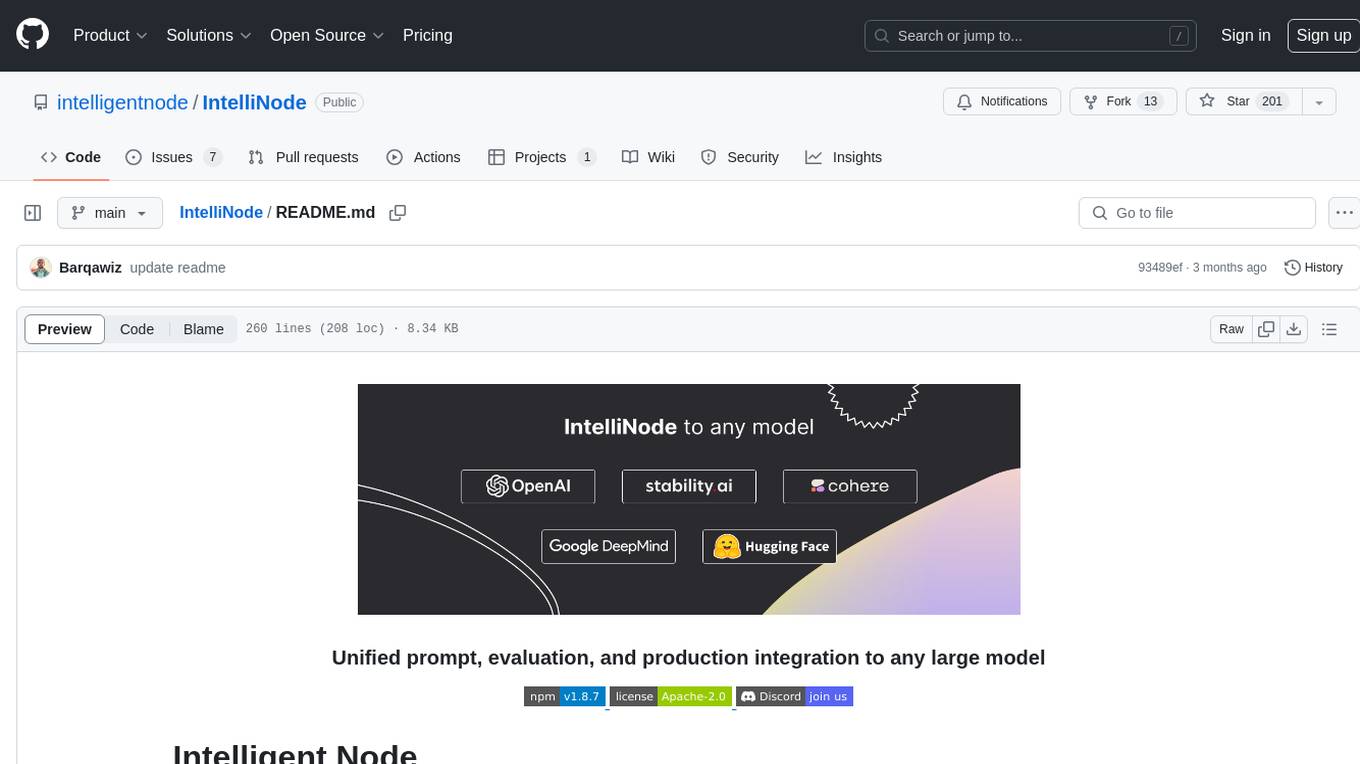
IntelliNode
IntelliNode is a javascript module that integrates cutting-edge AI models like ChatGPT, LLaMA, WaveNet, Gemini, and Stable diffusion into projects. It offers functions for generating text, speech, and images, as well as semantic search, multi-model evaluation, and chatbot capabilities. The module provides a wrapper layer for low-level model access, a controller layer for unified input handling, and a function layer for abstract functionality tailored to various use cases.
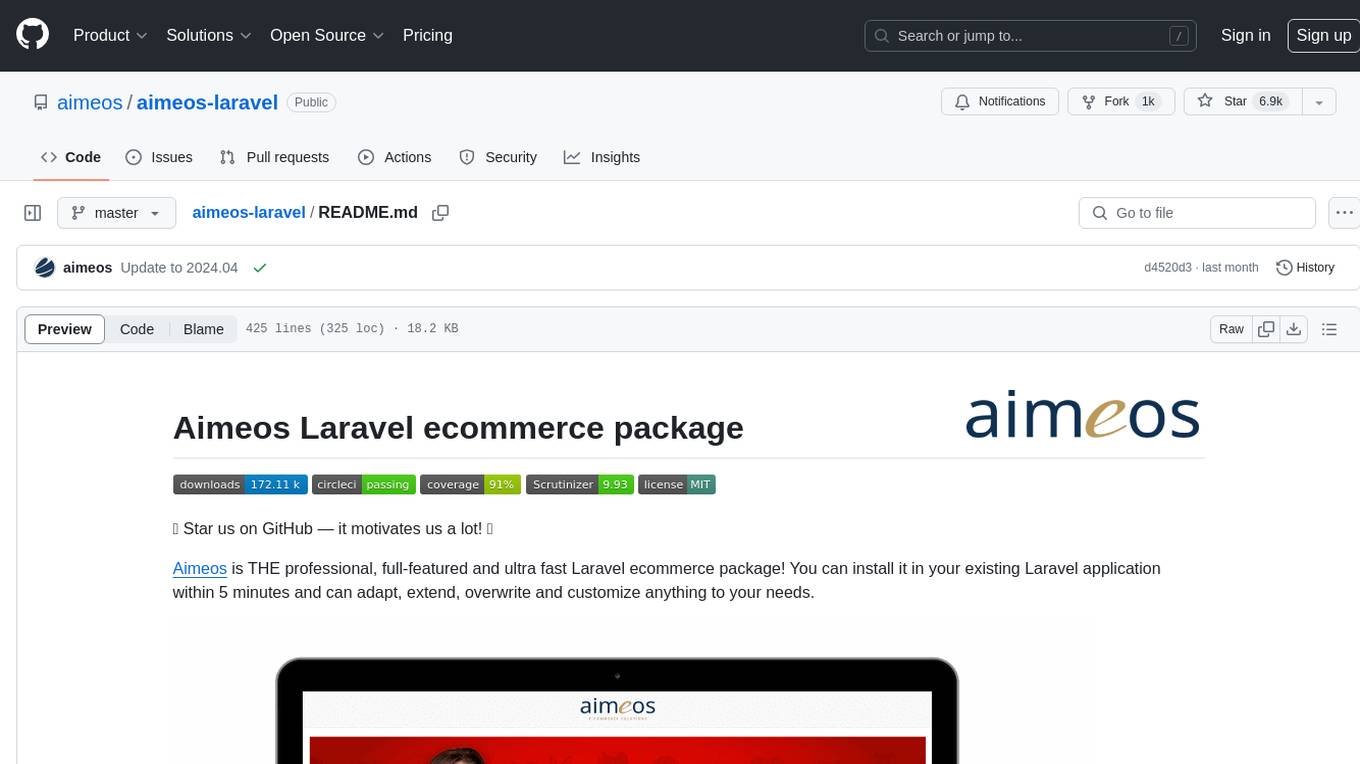
aimeos-laravel
Aimeos Laravel is a professional, full-featured, and ultra-fast Laravel ecommerce package that can be easily integrated into existing Laravel applications. It offers a wide range of features including multi-vendor, multi-channel, and multi-warehouse support, fast performance, support for various product types, subscriptions with recurring payments, multiple payment gateways, full RTL support, flexible pricing options, admin backend, REST and GraphQL APIs, modular structure, SEO optimization, multi-language support, AI-based text translation, mobile optimization, and high-quality source code. The package is highly configurable and extensible, making it suitable for e-commerce SaaS solutions, marketplaces, and online shops with millions of vendors.
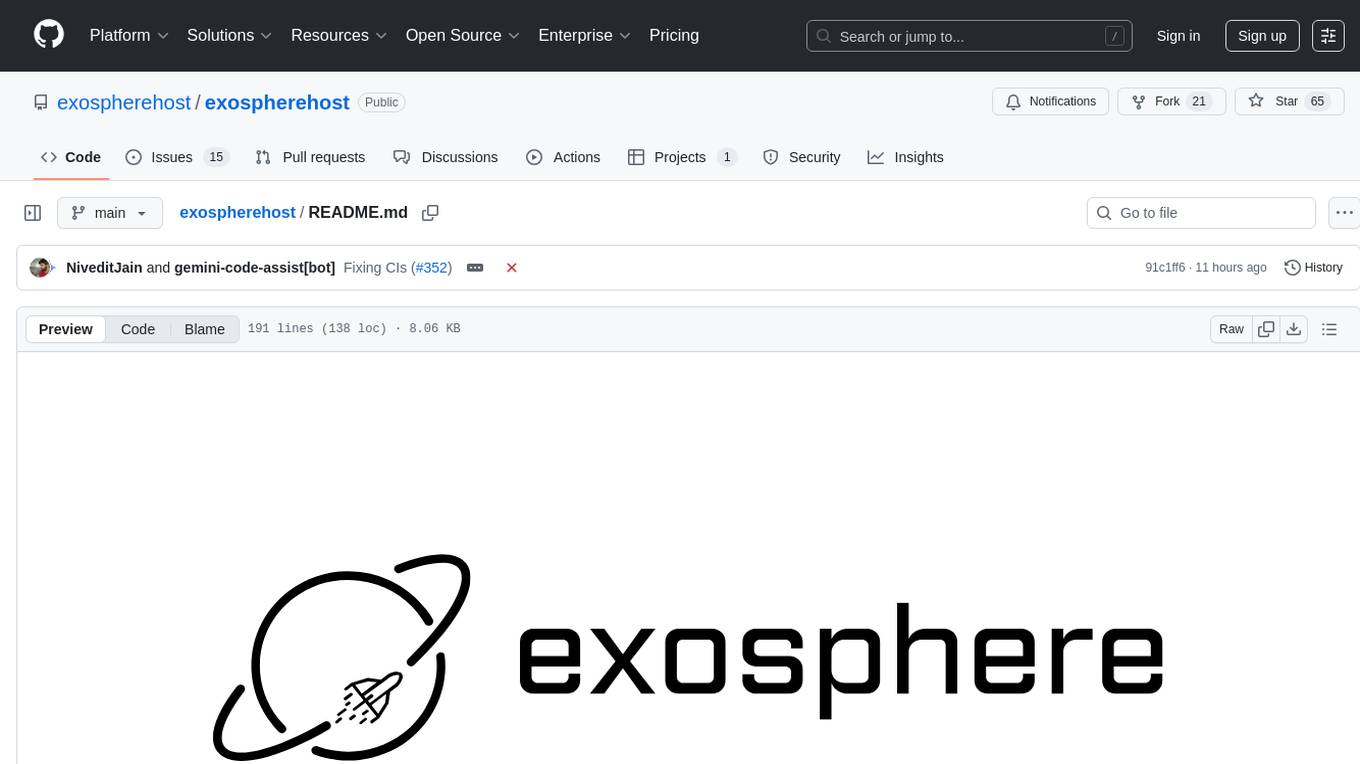
exospherehost
Exosphere is an open source infrastructure designed to run AI agents at scale for large data and long running flows. It allows developers to define plug and playable nodes that can be run on a reliable backbone in the form of a workflow, with features like dynamic state creation at runtime, infinite parallel agents, persistent state management, and failure handling. This enables the deployment of production agents that can scale beautifully to build robust autonomous AI workflows.

semantic-kernel
Semantic Kernel is an SDK that integrates Large Language Models (LLMs) like OpenAI, Azure OpenAI, and Hugging Face with conventional programming languages like C#, Python, and Java. Semantic Kernel achieves this by allowing you to define plugins that can be chained together in just a few lines of code. What makes Semantic Kernel _special_ , however, is its ability to _automatically_ orchestrate plugins with AI. With Semantic Kernel planners, you can ask an LLM to generate a plan that achieves a user's unique goal. Afterwards, Semantic Kernel will execute the plan for the user.
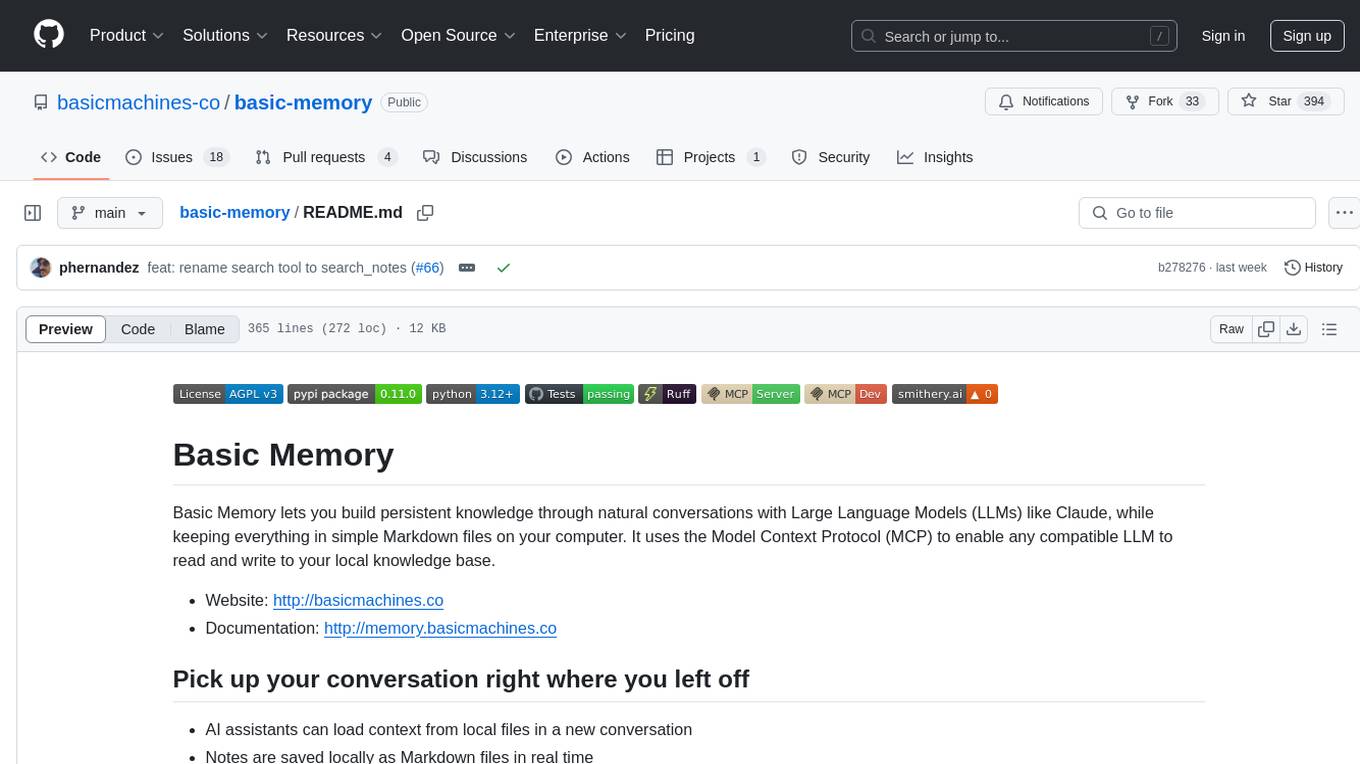
basic-memory
Basic Memory is a tool that enables users to build persistent knowledge through natural conversations with Large Language Models (LLMs) like Claude. It uses the Model Context Protocol (MCP) to allow compatible LLMs to read and write to a local knowledge base stored in simple Markdown files on the user's computer. The tool facilitates creating structured notes during conversations, maintaining a semantic knowledge graph, and keeping all data local and under user control. Basic Memory aims to address the limitations of ephemeral LLM interactions by providing a structured, bi-directional, and locally stored knowledge management solution.
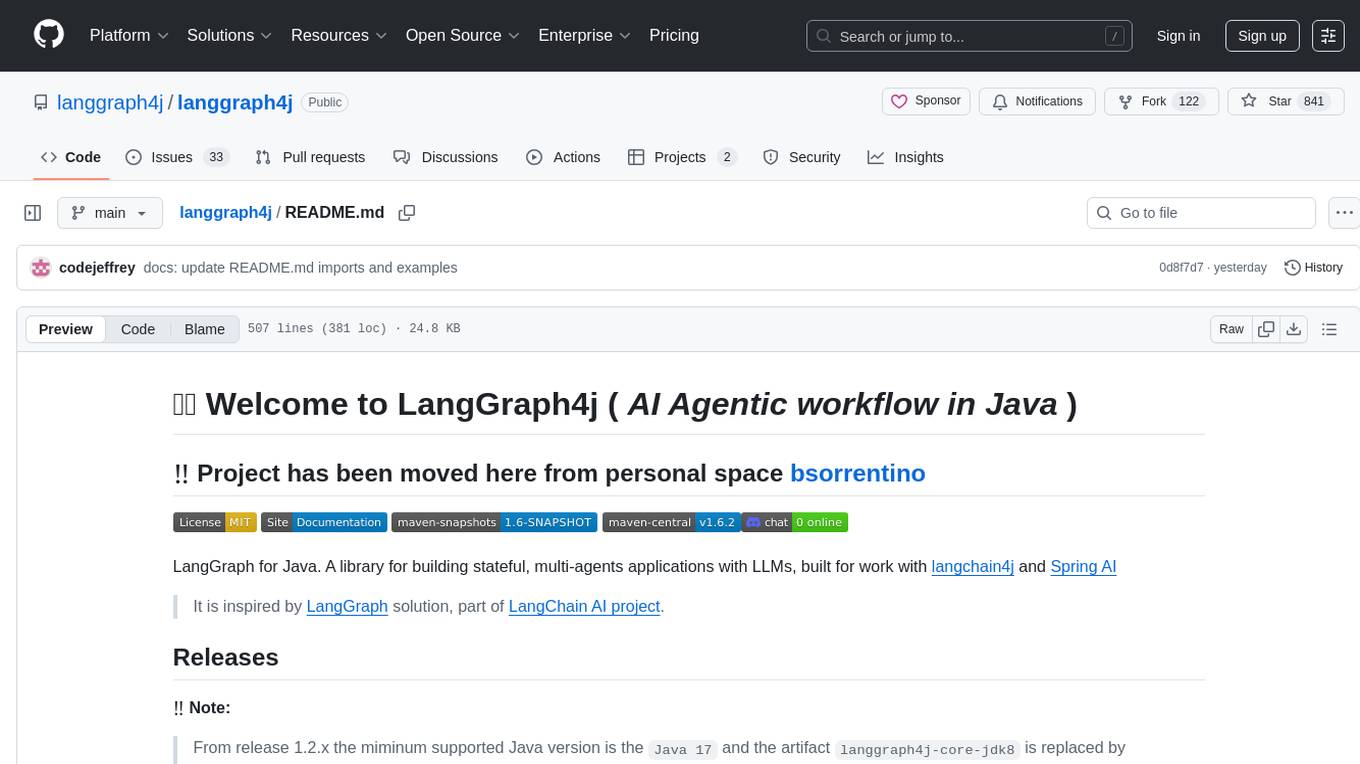
langgraph4j
Langgraph4j is a Java library for language processing tasks such as text classification, sentiment analysis, and named entity recognition. It provides a set of tools and algorithms for analyzing text data and extracting useful information. The library is designed to be efficient and easy to use, making it suitable for both research and production applications.

weave
Weave is a toolkit for developing Generative AI applications, built by Weights & Biases. With Weave, you can log and debug language model inputs, outputs, and traces; build rigorous, apples-to-apples evaluations for language model use cases; and organize all the information generated across the LLM workflow, from experimentation to evaluations to production. Weave aims to bring rigor, best-practices, and composability to the inherently experimental process of developing Generative AI software, without introducing cognitive overhead.
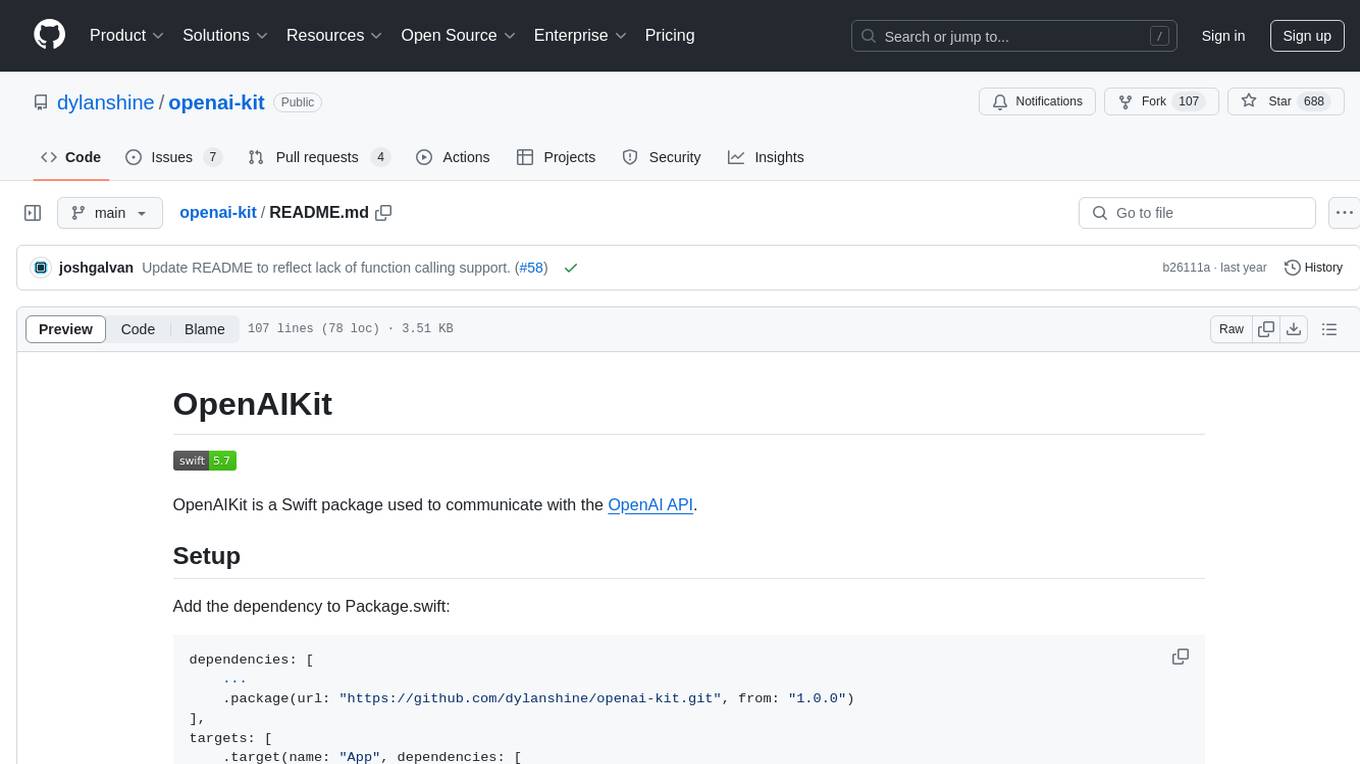
openai-kit
OpenAIKit is a Swift package designed to facilitate communication with the OpenAI API. It provides methods to interact with various OpenAI services such as chat, models, completions, edits, images, embeddings, files, moderations, and speech to text. The package encourages the use of environment variables to securely inject the OpenAI API key and organization details. It also offers error handling for API requests through the `OpenAIKit.APIErrorResponse`.
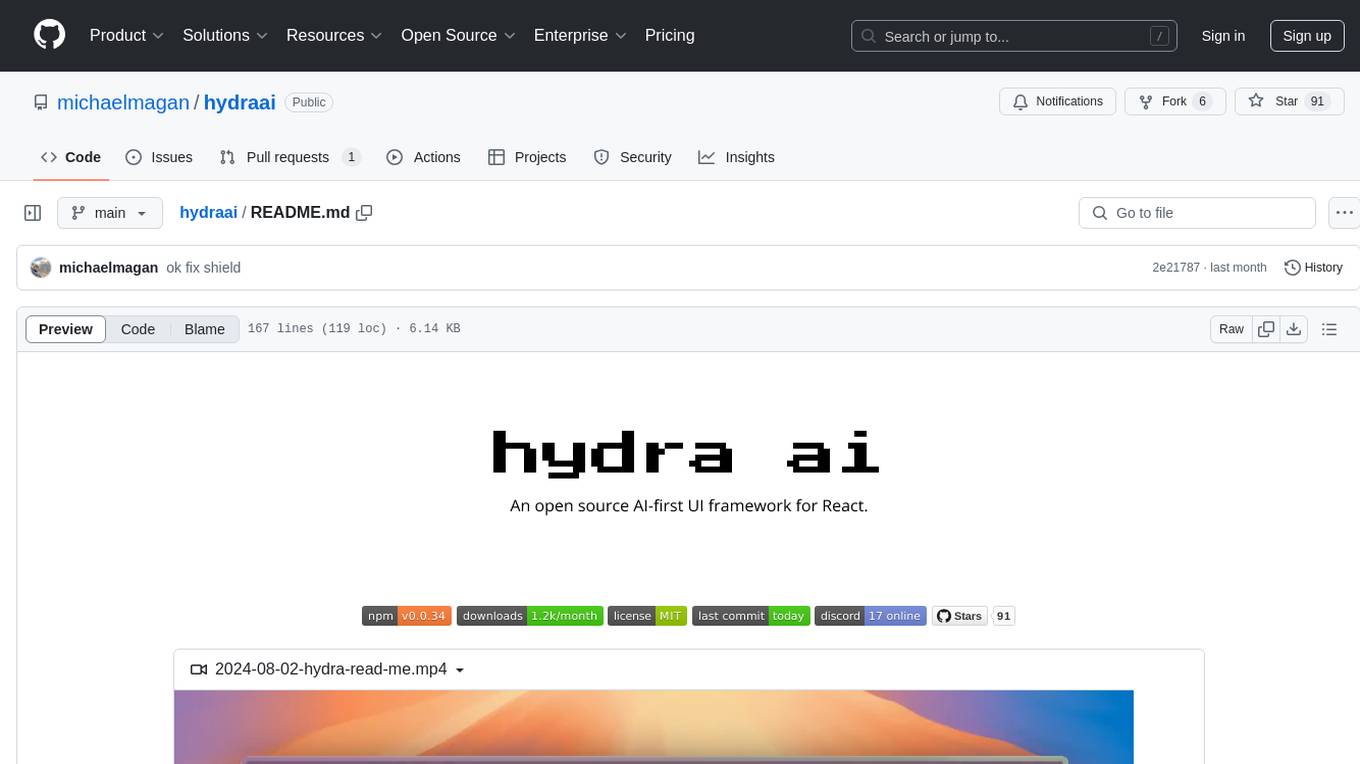
hydraai
Generate React components on-the-fly at runtime using AI. Register your components, and let Hydra choose when to show them in your App. Hydra development is still early, and patterns for different types of components and apps are still being developed. Join the discord to chat with the developers. Expects to be used in a NextJS project. Components that have function props do not work.
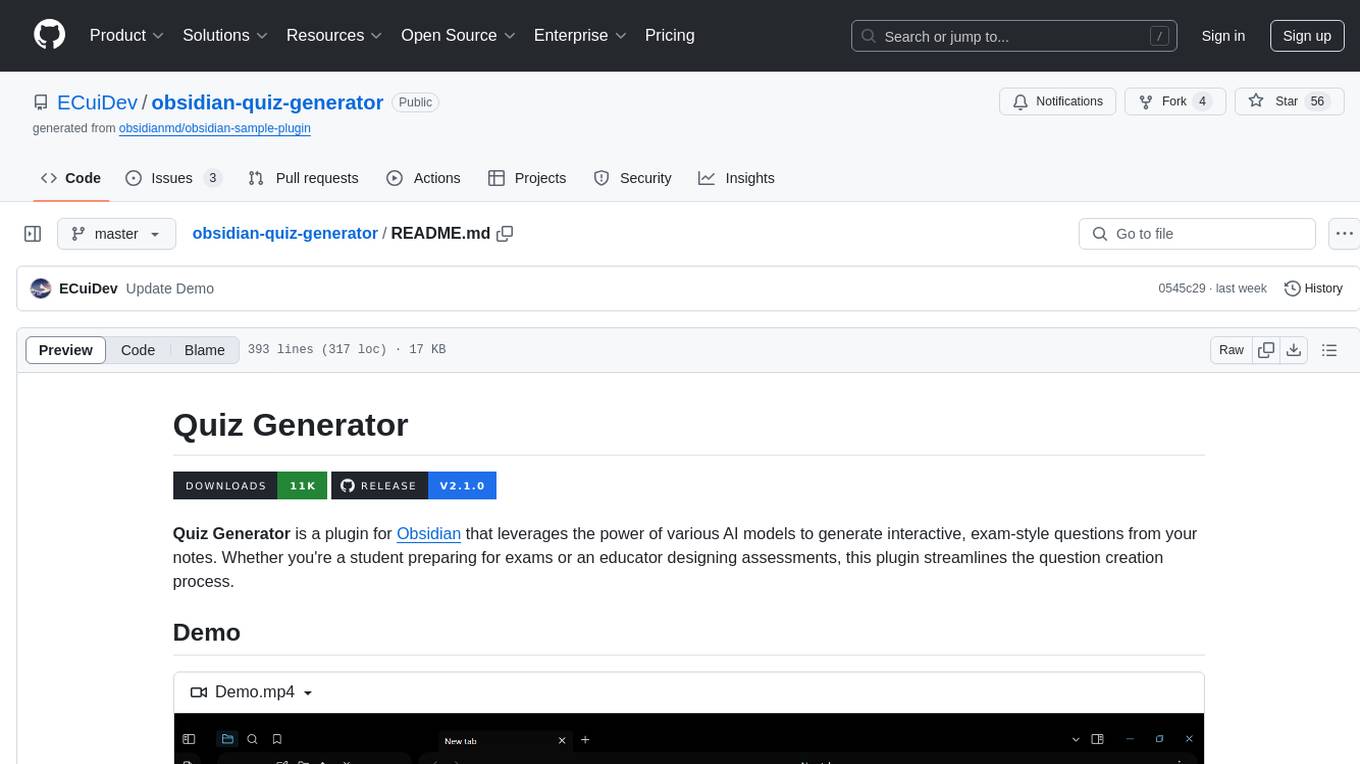
obsidian-quiz-generator
Quiz Generator is a plugin for Obsidian that uses AI models to create interactive exam-style questions from notes. It supports various question types and provides real-time feedback. Users can save questions, generate in multiple languages, and use math support. The tool is suitable for students preparing for exams and educators designing assessments.

refact-lsp
Refact Agent is a small executable written in Rust as part of the Refact Agent project. It lives inside your IDE to keep AST and VecDB indexes up to date, supporting connection graphs between definitions and usages in popular programming languages. It functions as an LSP server, offering code completion, chat functionality, and integration with various tools like browsers, databases, and debuggers. Users can interact with it through a Text UI in the command line.
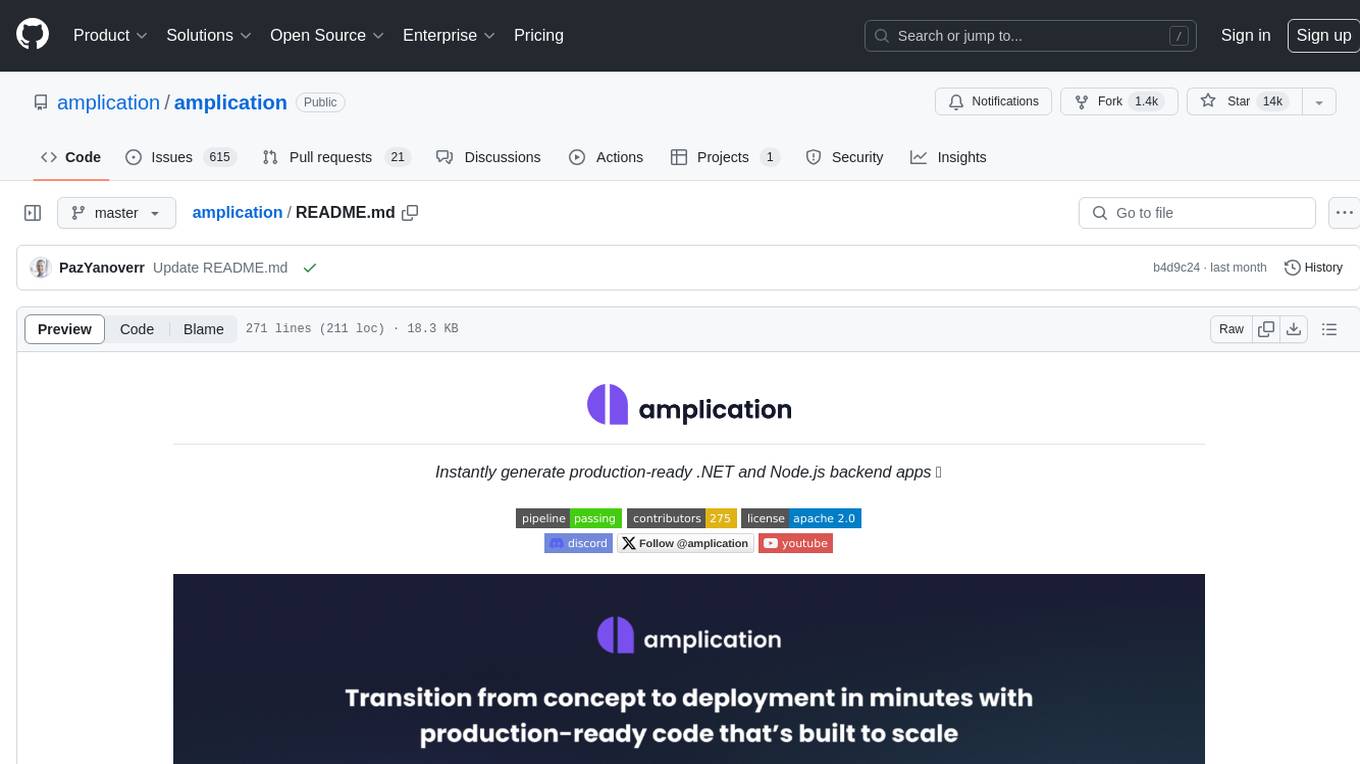
amplication
Amplication is a robust, open-source development platform designed to revolutionize the creation of scalable and secure .NET and Node.js applications. It automates backend applications development, ensuring consistency, predictability, and adherence to the highest standards with code that's built to scale. The user-friendly interface fosters seamless integration of APIs, data models, databases, authentication, and authorization. Built on a flexible, plugin-based architecture, Amplication allows effortless customization of the code and offers a diverse range of integrations. With a strong focus on collaboration, Amplication streamlines team-oriented development, making it an ideal choice for groups of all sizes, from startups to large enterprises. It enables users to concentrate on business logic while handling the heavy lifting of development. Experience the fastest way to develop .NET and Node.js applications with Amplication.
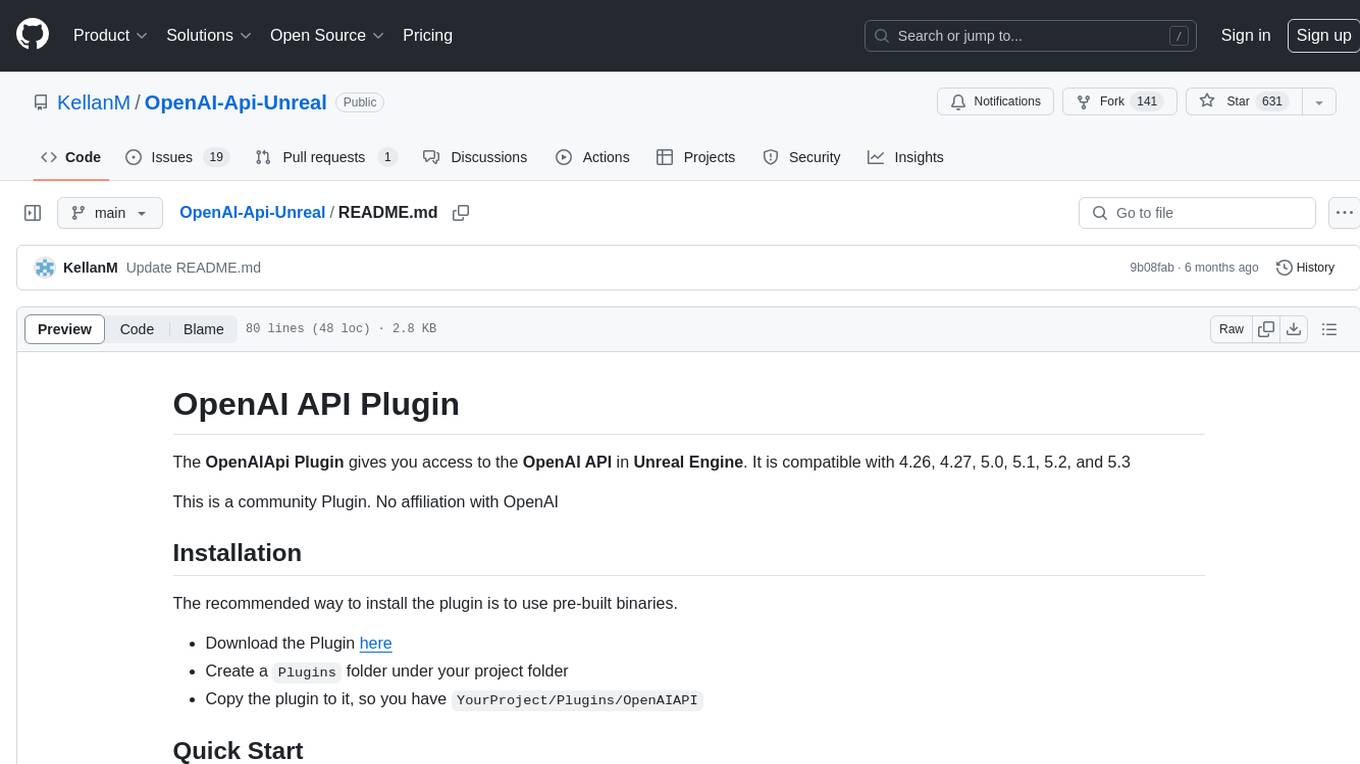
OpenAI-Api-Unreal
The OpenAIApi Plugin provides access to the OpenAI API in Unreal Engine, allowing users to generate images, transcribe speech, and power NPCs using advanced AI models. It offers blueprint nodes for making API calls, setting parameters, and accessing completion values. Users can authenticate using an API key directly or as an environment variable. The plugin supports various tasks such as generating images, transcribing speech, and interacting with NPCs through chat endpoints.
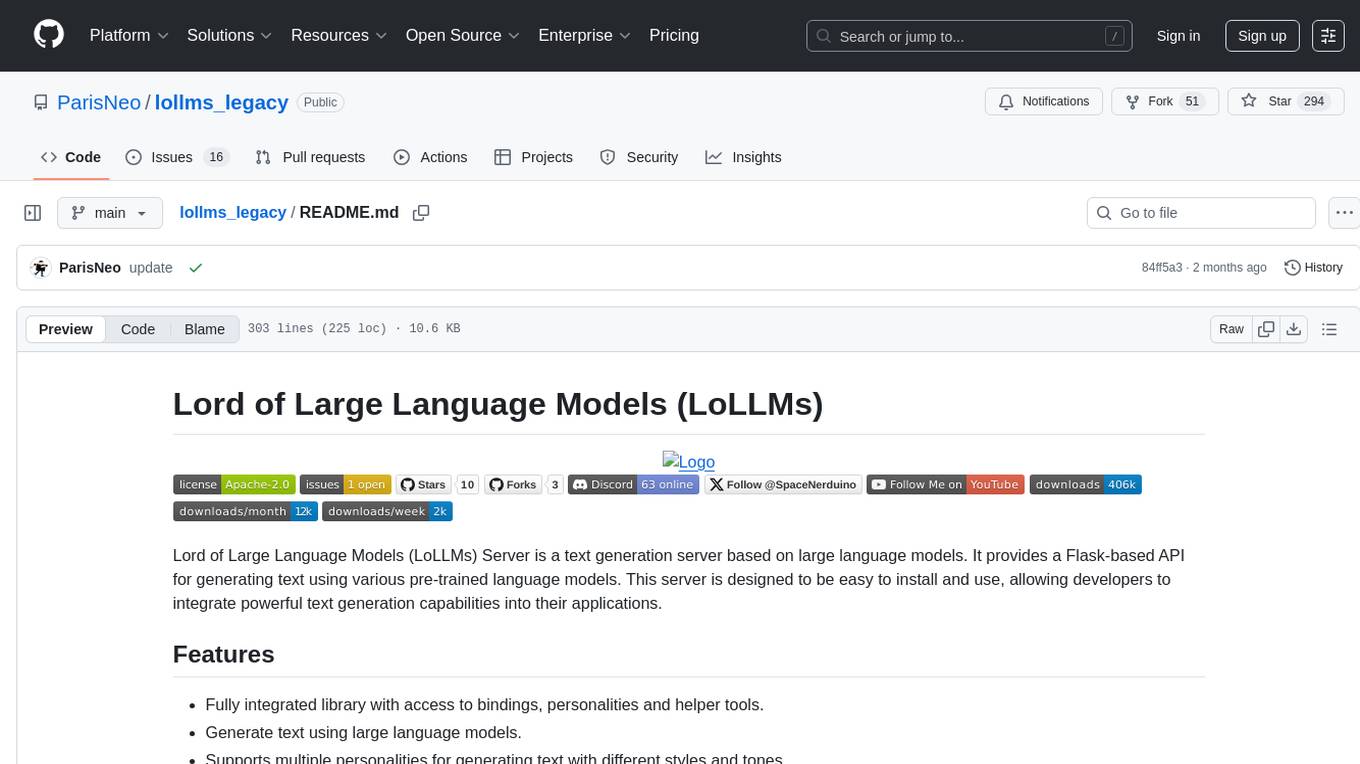
lollms_legacy
Lord of Large Language Models (LoLLMs) Server is a text generation server based on large language models. It provides a Flask-based API for generating text using various pre-trained language models. This server is designed to be easy to install and use, allowing developers to integrate powerful text generation capabilities into their applications. The tool supports multiple personalities for generating text with different styles and tones, real-time text generation with WebSocket-based communication, RESTful API for listing personalities and adding new personalities, easy integration with various applications and frameworks, sending files to personalities, running on multiple nodes to provide a generation service to many outputs at once, and keeping data local even in the remote version.

superagent-js
Superagent is an open source framework that enables any developer to integrate production ready AI Assistants into any application in a matter of minutes.
For similar tasks

StepWise
StepWise is a code-first, event-driven workflow framework for .NET designed to help users build complex workflows in a simple and efficient way. It allows users to define workflows using C# code, visualize and execute workflows from a browser, execute steps in parallel, and resolve dependencies automatically. StepWise also features an AI assistant called `Geeno` in its WebUI to help users run and analyze workflows with ease.

agentic-radar
The Agentic Radar is a security scanner designed to analyze and assess agentic systems for security and operational insights. It helps users understand how agentic systems function, identify potential vulnerabilities, and create security reports. The tool includes workflow visualization, tool identification, and vulnerability mapping, providing a comprehensive HTML report for easy reviewing and sharing. It simplifies the process of assessing complex workflows and multiple tools used in agentic systems, offering a structured view of potential risks and security frameworks.
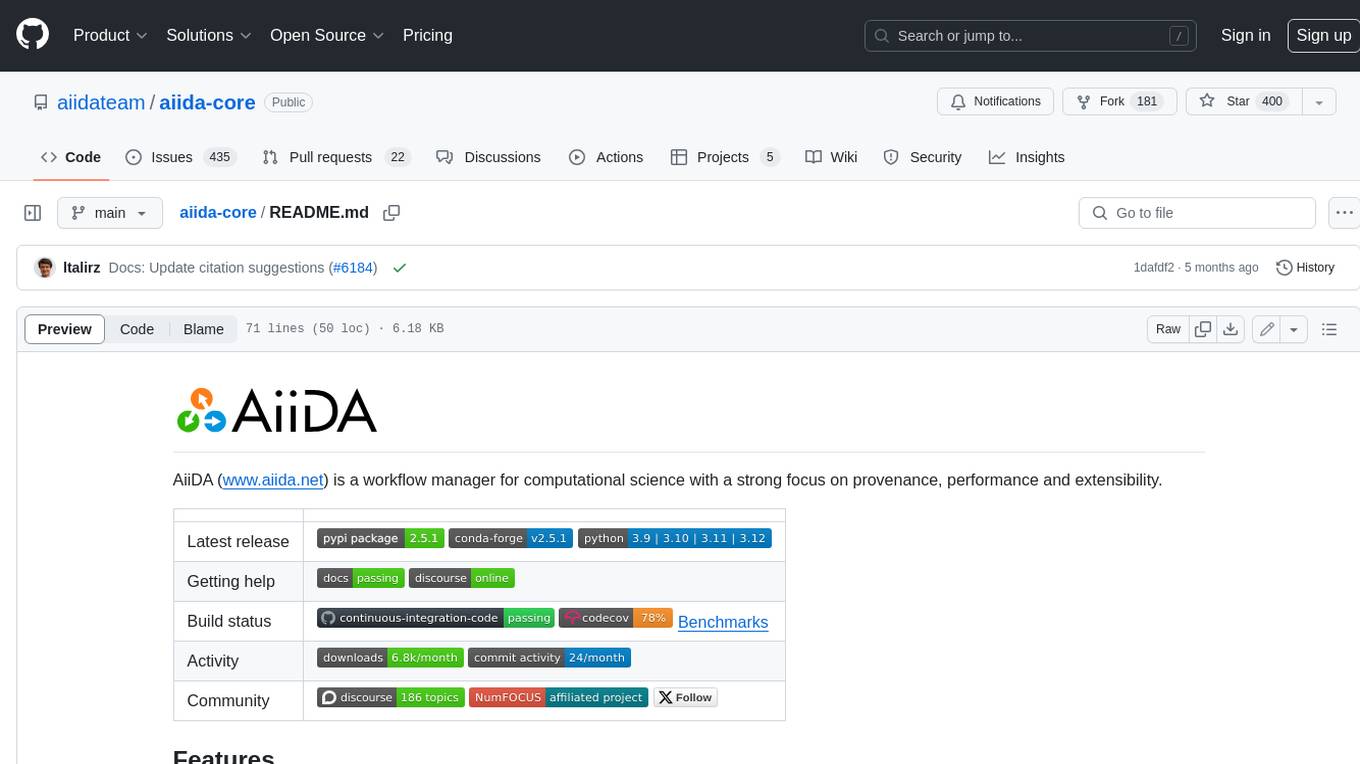
aiida-core
AiiDA (www.aiida.net) is a workflow manager for computational science with a strong focus on provenance, performance and extensibility. **Features** * **Workflows:** Write complex, auto-documenting workflows in python, linked to arbitrary executables on local and remote computers. The event-based workflow engine supports tens of thousands of processes per hour with full checkpointing. * **Data provenance:** Automatically track inputs, outputs & metadata of all calculations in a provenance graph for full reproducibility. Perform fast queries on graphs containing millions of nodes. * **HPC interface:** Move your calculations to a different computer by changing one line of code. AiiDA is compatible with schedulers like SLURM, PBS Pro, torque, SGE or LSF out of the box. * **Plugin interface:** Extend AiiDA with plugins for new simulation codes (input generation & parsing), data types, schedulers, transport modes and more. * **Open Science:** Export subsets of your provenance graph and share them with peers or make them available online for everyone on the Materials Cloud. * **Open source:** AiiDA is released under the MIT open source license
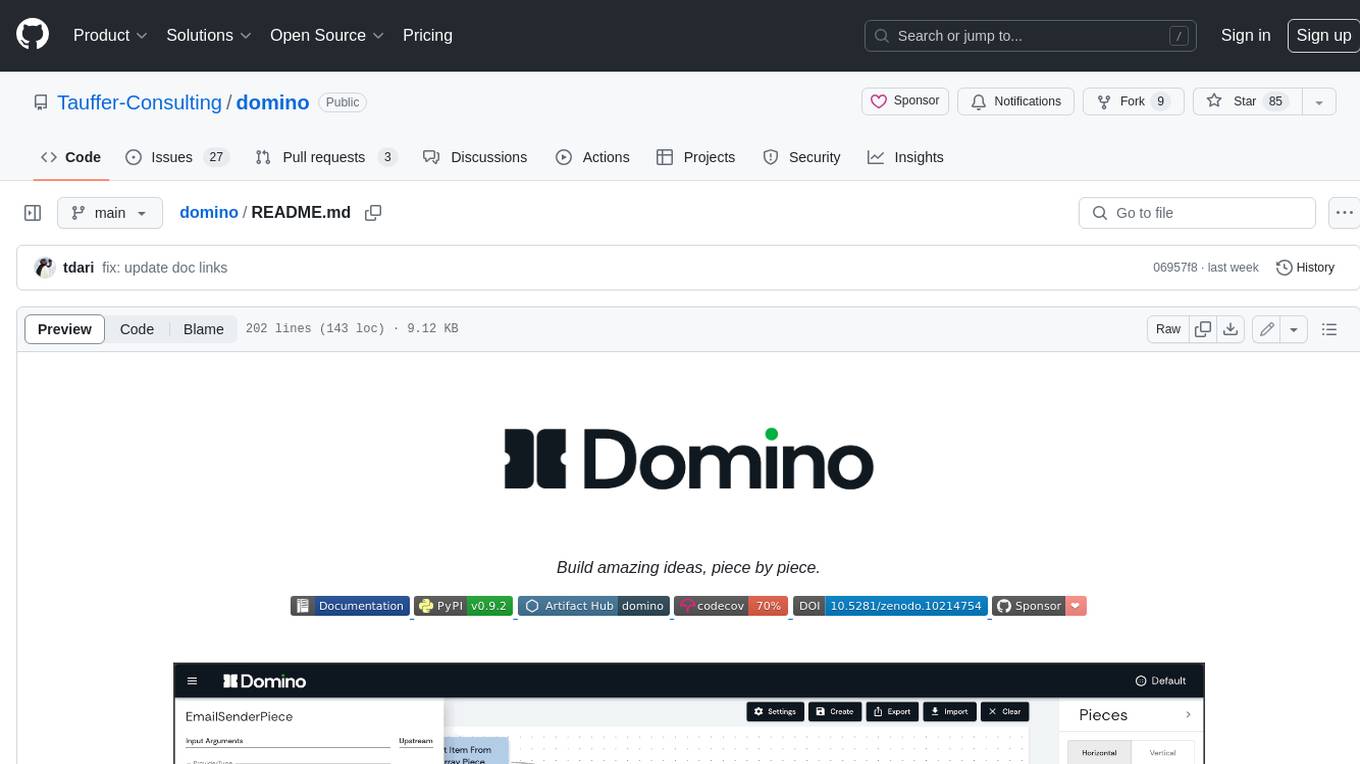
domino
Domino is an open source workflow management platform that provides an intuitive GUI for creating, editing, and monitoring workflows. It also offers a standard way of writing and publishing functional pieces that can be reused in multiple workflows. Domino is powered by Apache Airflow for top-tier workflows scheduling and monitoring.
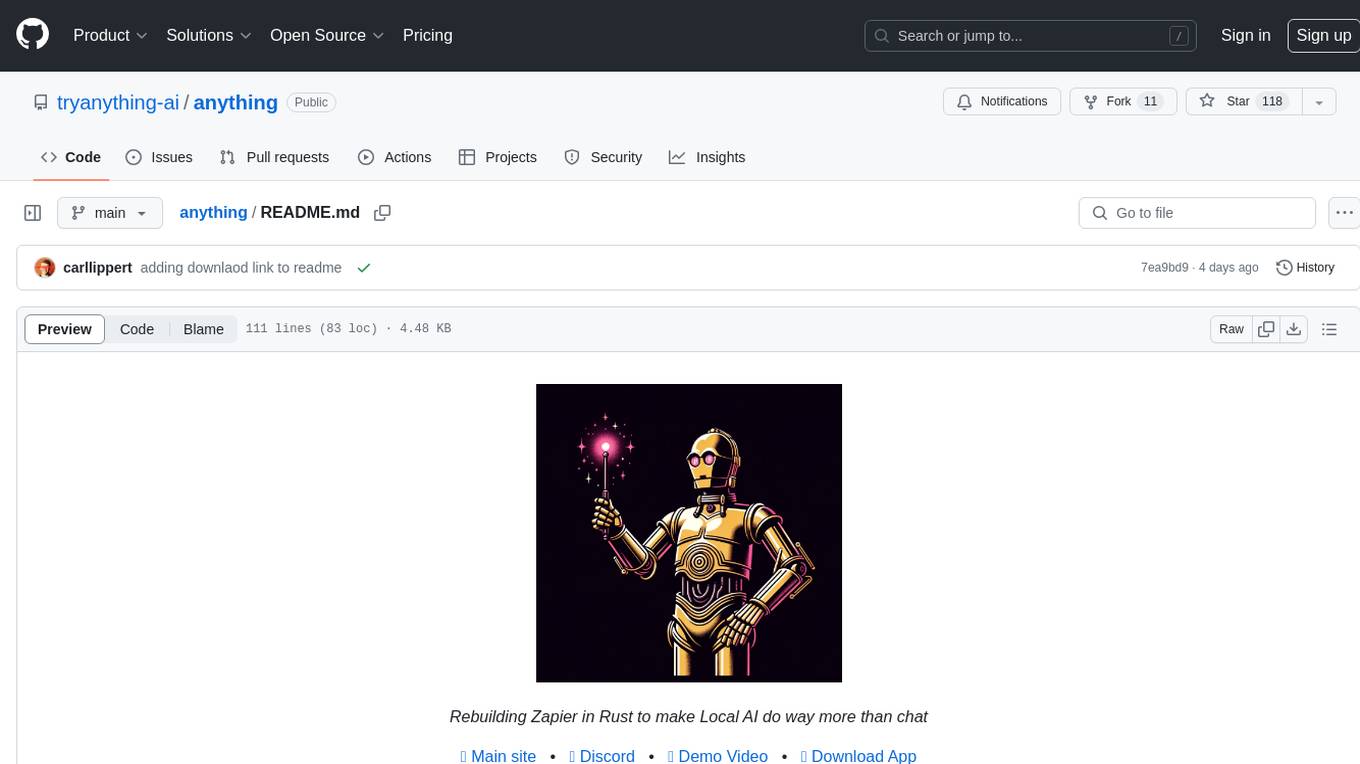
anything
Anything is an open automation tool built in Rust that aims to rebuild Zapier, enabling local AI to perform a wide range of tasks beyond chat functionalities. The tool focuses on extensibility without sacrificing understandability, allowing users to create custom extensions in Rust or other interpreted languages like Python or Typescript. It features an embedded SQLite DB, a WYSIWYG editor, event system, cron trigger, HTTP and CLI extensions, with plans for additional extensions like Deno, Python, and Local AI. The tool is designed to be user-friendly, with a file-first state approach, portable triggers, actions, and flows, and a human-centric file and folder naming convention. It does not require Docker, making it easy to run on low-powered devices for 24/7 self-hosting. The event processing is focused on simplicity and visibility, with extensibility through custom extensions and a marketplace for templates, actions, and triggers.
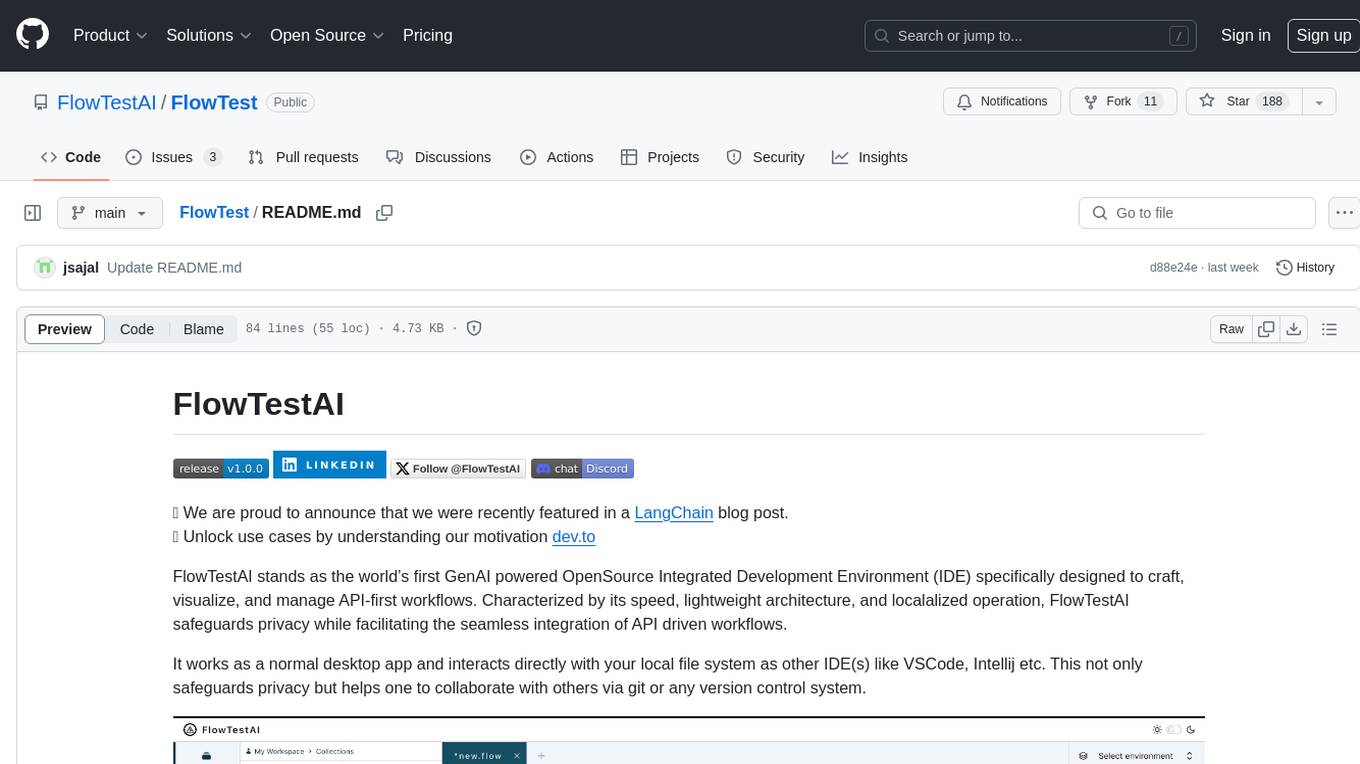
FlowTest
FlowTestAI is the world’s first GenAI powered OpenSource Integrated Development Environment (IDE) designed for crafting, visualizing, and managing API-first workflows. It operates as a desktop app, interacting with the local file system, ensuring privacy and enabling collaboration via version control systems. The platform offers platform-specific binaries for macOS, with versions for Windows and Linux in development. It also features a CLI for running API workflows from the command line interface, facilitating automation and CI/CD processes.

Geoweaver
Geoweaver is an in-browser software that enables users to easily compose and execute full-stack data processing workflows using online spatial data facilities, high-performance computation platforms, and open-source deep learning libraries. It provides server management, code repository, workflow orchestration software, and history recording capabilities. Users can run it from both local and remote machines. Geoweaver aims to make data processing workflows manageable for non-coder scientists and preserve model run history. It offers features like progress storage, organization, SSH connection to external servers, and a web UI with Python support.
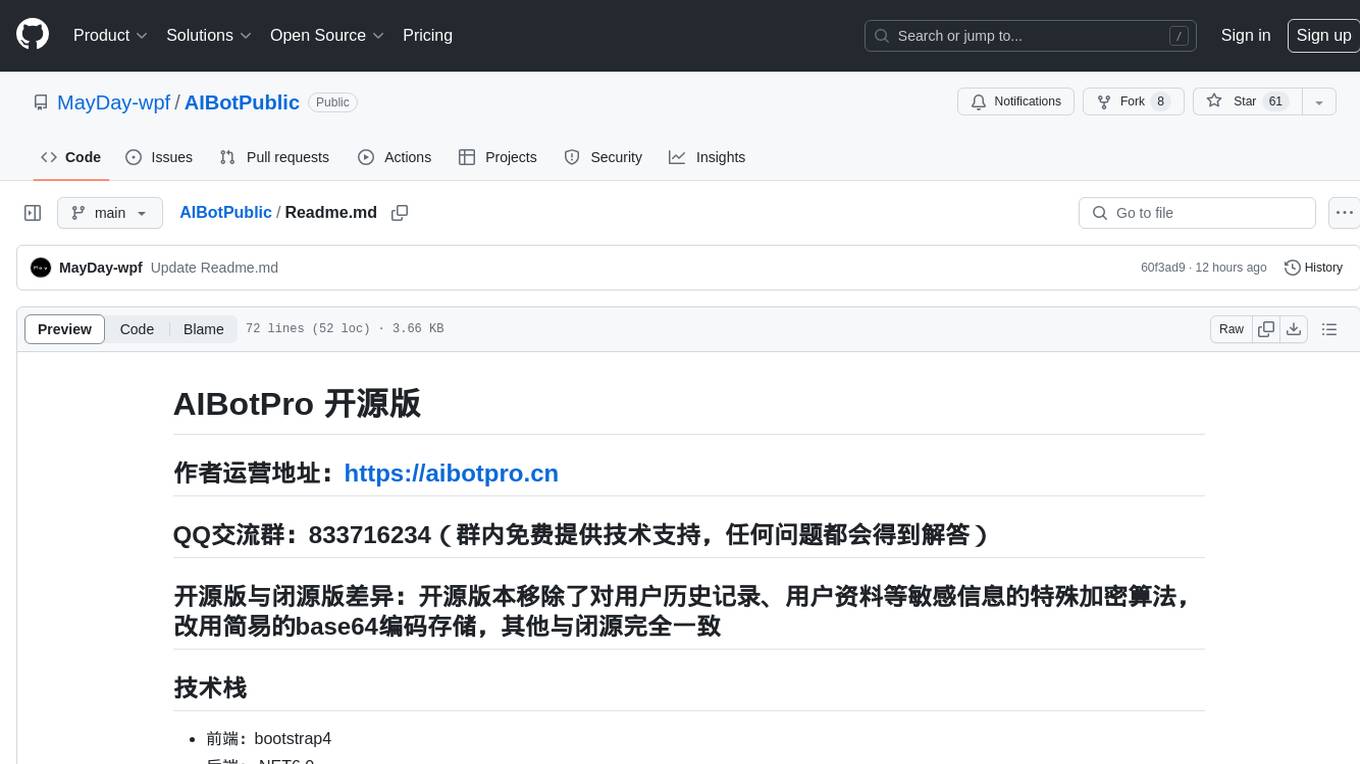
AIBotPublic
AIBotPublic is an open-source version of AIBotPro, a comprehensive AI tool that provides various features such as knowledge base construction, AI drawing, API hosting, and more. It supports custom plugins and parallel processing of multiple files. The tool is built using bootstrap4 for the frontend, .NET6.0 for the backend, and utilizes technologies like SqlServer, Redis, and Milvus for database and vector database functionalities. It integrates third-party dependencies like Baidu AI OCR, Milvus C# SDK, Google Search, and more to enhance its capabilities.
For similar jobs

sweep
Sweep is an AI junior developer that turns bugs and feature requests into code changes. It automatically handles developer experience improvements like adding type hints and improving test coverage.

teams-ai
The Teams AI Library is a software development kit (SDK) that helps developers create bots that can interact with Teams and Microsoft 365 applications. It is built on top of the Bot Framework SDK and simplifies the process of developing bots that interact with Teams' artificial intelligence capabilities. The SDK is available for JavaScript/TypeScript, .NET, and Python.

ai-guide
This guide is dedicated to Large Language Models (LLMs) that you can run on your home computer. It assumes your PC is a lower-end, non-gaming setup.

classifai
Supercharge WordPress Content Workflows and Engagement with Artificial Intelligence. Tap into leading cloud-based services like OpenAI, Microsoft Azure AI, Google Gemini and IBM Watson to augment your WordPress-powered websites. Publish content faster while improving SEO performance and increasing audience engagement. ClassifAI integrates Artificial Intelligence and Machine Learning technologies to lighten your workload and eliminate tedious tasks, giving you more time to create original content that matters.

chatbot-ui
Chatbot UI is an open-source AI chat app that allows users to create and deploy their own AI chatbots. It is easy to use and can be customized to fit any need. Chatbot UI is perfect for businesses, developers, and anyone who wants to create a chatbot.

BricksLLM
BricksLLM is a cloud native AI gateway written in Go. Currently, it provides native support for OpenAI, Anthropic, Azure OpenAI and vLLM. BricksLLM aims to provide enterprise level infrastructure that can power any LLM production use cases. Here are some use cases for BricksLLM: * Set LLM usage limits for users on different pricing tiers * Track LLM usage on a per user and per organization basis * Block or redact requests containing PIIs * Improve LLM reliability with failovers, retries and caching * Distribute API keys with rate limits and cost limits for internal development/production use cases * Distribute API keys with rate limits and cost limits for students

uAgents
uAgents is a Python library developed by Fetch.ai that allows for the creation of autonomous AI agents. These agents can perform various tasks on a schedule or take action on various events. uAgents are easy to create and manage, and they are connected to a fast-growing network of other uAgents. They are also secure, with cryptographically secured messages and wallets.

griptape
Griptape is a modular Python framework for building AI-powered applications that securely connect to your enterprise data and APIs. It offers developers the ability to maintain control and flexibility at every step. Griptape's core components include Structures (Agents, Pipelines, and Workflows), Tasks, Tools, Memory (Conversation Memory, Task Memory, and Meta Memory), Drivers (Prompt and Embedding Drivers, Vector Store Drivers, Image Generation Drivers, Image Query Drivers, SQL Drivers, Web Scraper Drivers, and Conversation Memory Drivers), Engines (Query Engines, Extraction Engines, Summary Engines, Image Generation Engines, and Image Query Engines), and additional components (Rulesets, Loaders, Artifacts, Chunkers, and Tokenizers). Griptape enables developers to create AI-powered applications with ease and efficiency.




